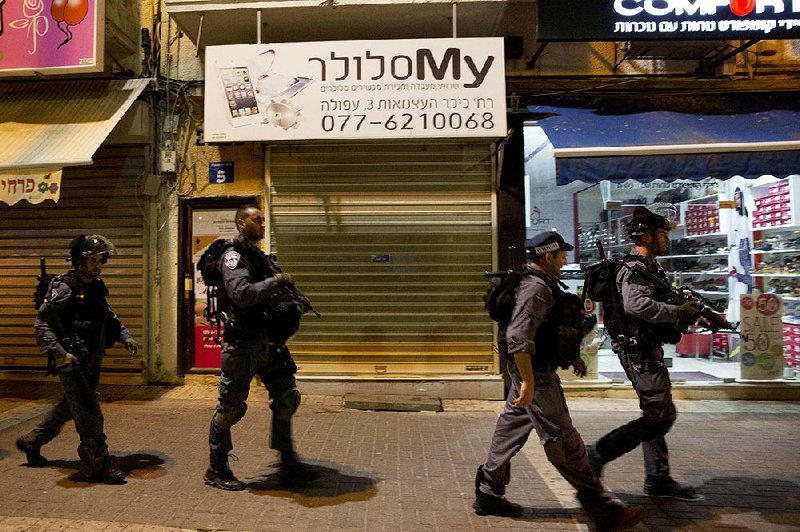JERUSALEM -- A Palestinian stabbed four Israelis with a screwdriver Thursday before a soldier shot and killed him in fresh violence focused on a sensitive Jerusalem holy site.
The attack in Tel Aviv was among four new stabbings Thursday that left several people wounded.
The screwdriver-wielding assailant, a Palestinian from east Jerusalem, stabbed and wounded four Israelis, including a female soldier, near a busy Tel Aviv road before being shot dead, police spokesman Luba Samri said.
After attacks in Jerusalem and the West Bank left two Israelis seriously wounded Thursday, the violence spread deeper into Israel. Police said an Arab attacker stabbed and moderately wounded an Israeli soldier in the northern city of Afula.
Palestinian protesters meanwhile clashed with Israeli forces in a number of locations in the West Bank and east Jerusalem, where a 20-year-old protester was killed by live fire, according to a Palestinian hospital official and witnesses.
Four Israelis have been killed in attacks over the past week. Seven Palestinians, including four attackers, have been killed in the unrest. More than 130 Palestinians have been wounded in demonstrations and clashes across the West Bank and east Jerusalem.
At a news conference with the country's top defense officials, Prime Minister Benjamin Netanyahu tried to calm Israelis. He called on Israelis to remain alert, and he praised civilians, soldiers and police who have acted to stop attackers.
"Israelis are acting with bravery, courage, restraint and determination to neutralize and kill the terrorists in the act," he said.
The Jerusalem hilltop holy site lies at the heart of recent tensions. It's revered by Muslims as the spot where the Prophet Muhammad ascended to heaven and by Jews as the site of the two Jewish biblical temples.
Many Palestinians assert that Israel is trying to expand the Jewish presence at the site, a claim Israel denies. Under a long-standing arrangement administered by Islamic authorities, Jews are allowed to visit the site during certain hours but not pray there.
The latest unrest began about three weeks ago as Palestinians repeatedly barricaded themselves inside the Al-Aqsa mosque at the sacred site, and hurled stones, firebombs and fireworks at the police.
The violence later spread to Arab neighborhoods of east Jerusalem and to the West Bank, and on Tuesday there were disturbances in Jaffa, a largely Arab area of Tel Aviv.
Palestinian President Mahmoud Abbas said Thursday that he would not allow his people to be "dragged" into more violence with Israel. Speaking to business leaders in the West Bank city of Ramallah, he said he was committed to "peaceful popular resistance," though he backs the protesters who have clashed with Israeli police at Al-Aqsa.
He insisted the Palestinians are not interested in a further escalation but that his "hands are with those who are protecting Al-Aqsa mosque."
The attacks were initially confined to east Jerusalem and the West Bank, territory seized by Israel in the 1967 war and claimed by the Palestinians for a future state.
But on Wednesday, new stabbings occurred outside a crowded mall in central Israel and in a southern Israeli town. Netanyahu has warned Israelis to be on guard as the attacks have spilled into the Israeli heartland.
Israel has beefed up security in response to the violence in Jerusalem, and on Thursday, police set up metal detectors at the entrance to Israel's Old City.
An Israeli official, who spoke on condition of anonymity under regulations, said that Netanyahu ordered the ban on officials visiting the holy site because he was concerned it could spark further violence.
In a statement from Geneva on Thursday, the United Nations human-rights chief appealed for calm, warning that "more bloodshed will only lead to more hatred on both sides."
Zeid Raad al-Hussein said he was "deeply concerned at the increasing number of reported attacks" by both Israeli settlers and Palestinians. "The high number of casualties, in particular those resulting from the use of live ammunition by Israeli security forces, raise concerns of excessive use of force," he said.
Dozens of Palestinian protesters threw stones at Israeli troops near the West Bank city of Ramallah and elsewhere Thursday. Israeli forces responded with tear gas and stun grenades.
In another sign of tensions, Jerusalem Mayor Nir Barkat -- a former military officer and licensed gun owner -- defended his decision to carry a weapon during a visit this week to an Arab neighborhood. On Thursday, he encouraged other licensed gun owners to also carry their weapons.
"One of the advantages Israel has is that there are many veterans of military units with operational combat experience," he said. "Having a weapon increases the resident's confidence."
Information for this article was contributed by Mohammed Daraghmeh of The Associated Press.
A Section on 10/09/2015

